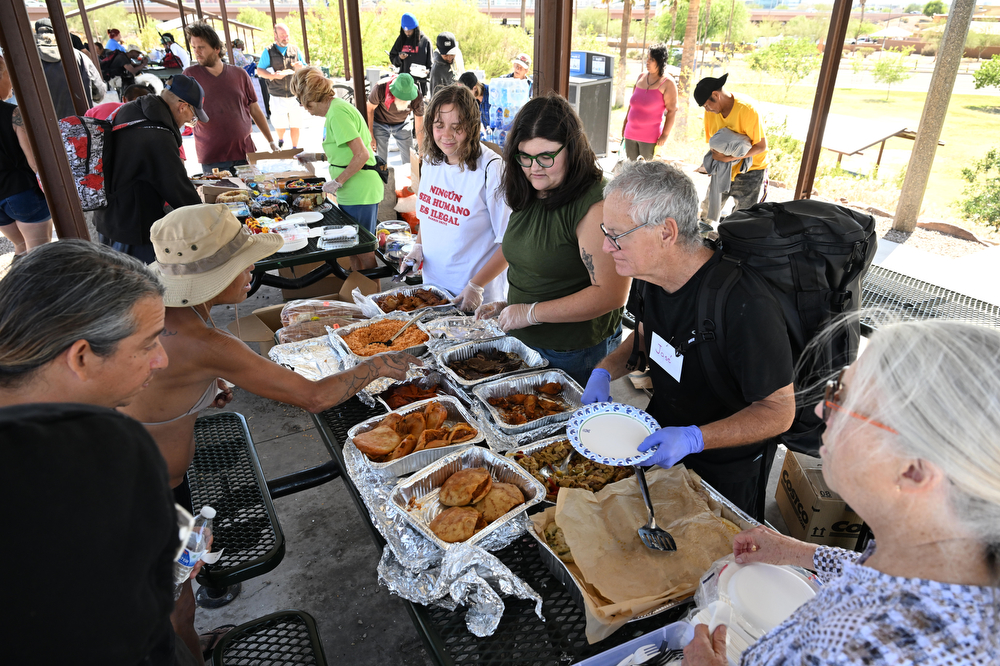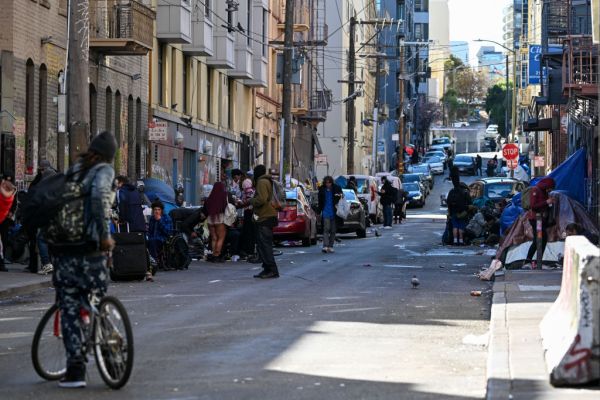Three years ago, the city of Tempe, Arizona, was celebrating Austin Davis as a hero. It even gave him an award for his charitable work, which included driving the city’s homeless people to addiction or mental health services and putting on Sunday picnics, where he shared food with those who were hungry. Last summer, he was jailed for the same work.
In 2023, the city began requiring Davis’ group, AZ Hugs, to obtain “special events” permits to host public picnics. Even though Davis didn’t think the law applied to him, he tried to get one. But the city said he wasn’t qualified because he had continued these picnics while his application was pending.
Undeterred, Davis continued to share food, taking care to clean up after each event. Equally undeterred, Tempe police began citing him each time. After multiple charges, threats of serious fines, and even spending a night in jail, Davis finally relented. He accepted a plea deal that prohibited him from entering public parks or any other areas where homeless people gathered.
Tempe’s about-face represents a larger trend: States and localities are requiring approval for all manner of activities—including basic acts of kindness. America has a permission problem, and it goes well beyond requiring permits to pass out food. Occupational licensing helps put people into poverty by creating barriers to work, and other permitting requirements make it difficult for them to dig themselves out or receive assistance. And such barriers ignore a rich American tradition.
Private charity in America goes back to before the founding. Neighbors, churches, and nonprofits have come to the aid of those in need long before bureaucrats demanded oversight. But studies show that, as the government took over that role, charity has shrunk. And as our permission society has expanded, charity has become more difficult. So, how does a society so deeply entrenched in a culture of permission walk it back?
The rise of permission culture.
In Timothy Sandefur’s Permission Society, he laments the fact that “today’s leading politicians, judges, intellectuals, and activists now believe that we are not free unless and until the government says we are.” Americans must procure licenses or permits for many aspects of their daily lives—and not just to drive a car or build a home. Specific state regulations vary, but occupational licensing creates barriers to jobs, from cutting hair to installing home entertainment equipment and walking dogs. If you have to get a license to shampoo hair for a living, there’s reason to ask whether our permission society has run amok.
Zoning laws and onerous permitting processes for building a home have driven up costs in many markets. It’s not just the cost of building permits themselves, though those can add up. Localities often try to pile on mitigation fees or force landowners to fund subsidized housing programs. All that red tape results in fewer homes being built, reducing housing supply. As Homelessness Is a Housing Problem, by Gregg Colburn and Clayton Page Aldern, points out, affordability and availability of housing is the most relevant factor for homelessness—not drug use or mental health.
Health care, too, is plagued by needless red tape. In many states, one can’t provide mental health services or build a drug addiction center without first securing a Certificate of Need (CON). Procuring a CON requires providers to get permission not just from the government but from existing businesses—their potential competitors, which creates an obvious conflict of interest and leads to fewer providers. The real-world effects are devastating. When a young man in Iowa with severe intellectual disabilities assaulted his mother while in the midst of a mental health crisis, local officials scrambled to find him an inpatient psychiatric bed. None were available, so he was forced to spend five days in jail and another three chained to a hospital bed under constant guard, simply because no facility could take him. A company had offered to build a new mental health hospital in the region but could not surmount the state’s CON law.
The result of fewer homes, fewer jobs, and fewer health care services is, of course, less wealth and higher levels of homelessness. And then, once you’re there, the same licensing and permitting structures make it difficult to escape. That’s because these restrictions also hinder efforts to help those in need. Bureaucrats have thwarted low-cost housing solutions, mobile hygiene units, transitional housing programs, and drug and mental health services in the name of protecting the public.
Like Tempe, some cities are outright criminalizing unlicensed do-gooding. In Dayton, Ohio, officers recently put a volunteer in handcuffs for passing out burritos. In Missouri, officials went so far as to pour bleach in the soup that a charitable group planned to hand out without a permit.
Cities like Dayton specifically outlaw offering food or clothing to the homeless without a permit. Others, like Tempe, appear to be bending their “special event” laws to cover charity. Why do cities make it so hard for residents to help one another? Davis and volunteers like him typically leave the parks cleaner than they find them, and those concerns can be addressed by littering or nuisance laws. Requiring an expensive special events permit for charity does nothing to ensure clean parks, usable spaces, or safe food.
America the charitable.
From the Puritans and Quakers who started philanthropic institutions in the 1700s to the modern institutions that teach chess to children in inner-city Chicago, charity is a fundamental part of the American way of life. It was private charity that allowed the orphaned Founding Father Alexander Hamilton to leave the island of Saint Croix and study in America. Many Ivy League schools started as charitable institutions, as did many hospitals, including the renowned St. Jude’s Children’s Hospital.
How can the charitably minded overcome the hurdles placed by local governments? One path is bringing lawsuits, as Davis has done in Arizona, where he is being represented by the Pacific Legal Foundation. The problem is: Not all rights are created equal. Unless a civil rights plaintiff can claim a right explicitly listed in the Constitution, judges tend to protect that right under a form of judicial scrutiny called the “rational basis test.” Under that test, a law will be upheld so long as the judge can conceive of a reason for it—an easy standard for the government to meet. For this reason, lawsuits on behalf of charitable institutions have fared better if they can persuade the judge that some First Amendment interest is at stake, like freedom of speech or religion. Where judges accept that free speech rights are involved, they apply “strict” judicial scrutiny, meaning the restriction must be struck down unless the government can prove it’s necessary to achieve some compelling government purpose.
Nourish Our Neighbors, the group in Dayton whose member was handcuffed for handing out a burrito, refuses to get a permit not just because it’s expensive but because of ideological opposition: The group views securing a permit as contrary to its mission when the people it serves do not get the luxury of permits or even the essentials needed to live. As one member explained:
“We are … concerned with what acquiring permits would do to our existing relationships with the people we service. We have set the precedent that if they are not safe from police brutality and harassment then we aren’t either and we won’t use resources we have that they don’t to make ourselves safer when we willingly put ourselves in their environment. The moment we leave—they are susceptible to arrest, tickets, harassment, etc. We’ve shown our unhoused neighbors we will always stand with them on equal footing.”
The group sees its activities as a protest against how society treats the homeless, and like Davis, it has also brought a lawsuit. If the judge agrees that its activity is First Amendment expression, it will be much more likely to win than if its activities are considered mere conduct.
Austin Davis’ and Nourish Our Neighbors’ stories are a warning, and they demonstrate how freedom is quietly being redefined in America. In just three years, Davis went from hero to defendant. But he’s guilty only of refusing to ask for permission to care.









Please note that we at The Dispatch hold ourselves, our work, and our commenters to a higher standard than other places on the internet. We welcome comments that foster genuine debate or discussion—including comments critical of us or our work—but responses that include ad hominem attacks on fellow Dispatch members or are intended to stoke fear and anger may be moderated.
With your membership, you only have the ability to comment on The Morning Dispatch articles. Consider upgrading to join the conversation everywhere.